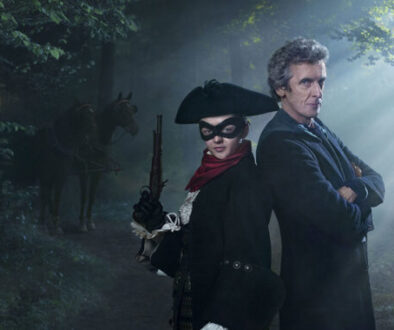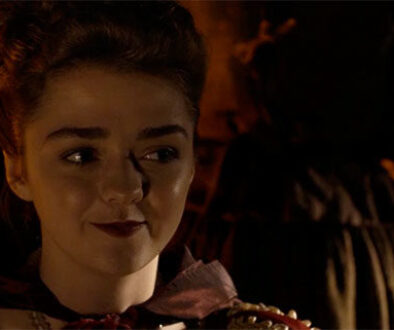The Girl Who Died Advance Review
Note: Doctor Who TV’s pre-air reviews aim to be as detail-free as we reasonably can while still offering a critique, but as everyone’s spoiler sensibilities are different, we advise you read on at your own discretion.

The Girl Who Died is an episode that appears to have all the winning ingredients in place: a writing collaboration between Steven Moffat and Jamie Mathieson (of last year’s fan favourites Mummy on the Orient Express and Flatline), Maisie Williams and Vikings! In theory it should produce something amazing, but the finished article isn’t quite the perfect amalgamation many fans will be hoping for.
The plot kicks into gear when our TARDIS duo land in medieval England and are promptly captured by a gang of Vikings (very much the stereotypical variety, sorry history buffs). They soon meet a young girl called Ashildr who ends up bringing war to her village after challenging the ‘mighty god’ Odin. This of course leads to the Doctor attempting to get some ill-prepared villagers in shape for a battle they seemingly can’t win.
Coming off the back of two pretty dark stories, this is immediately striking as a more lighthearted affair, which is perhaps a surprise given the title. The medieval setting may of course remind fans of last year’s Robot of Sherwood, but this isn’t quite as silly as that. There are a few more dramatic scenes and emotional character beats, and that’s often where the episode works at its best.
With a lighter script comes a lighter Doctor. Yes, expect the return of the Yo-Yo and the Doctor’s inexplicable ability to be able to speak baby. Although this is an idea that probably should have languished with the 11th Doctor’s era, it at least allows for a few poignant scenes here, which suit Capaldi’s Doctor better than the japery. One of the other highlights is Twelve learning where his face came from, and although the explanation will likely disappoint many after being teased this long, the moments leading up and after the revelation are Capaldi on top form.
There isn’t much progression for Clara this week. Sadly many of her scenes just go over material we’ve already seen without really adding anything new. There’s even a repeat of some exact lines from previous episodes. Intentional or not, it feels a bit uninspired.
The mystery surrounding Maisie Williams’ character has been hyped up a fair degree, with a whole host of returning characters speculated. All we’ll say is that there seems to be more to the character than meets the eye, and the Doctor can’t shake off his feeling that he already knows her. For Game of Thrones fans it may be hard to see something other than Arya in Williams’ performance. The character traits don’t exactly dissuade that; Ashildr is another headstrong tomboy with a determination to fight against the odds. There just isn’t a great deal to challenge Williams here. It feels like the best is to come in next week’s follow up. Speaking of…
Something that should probably be mentioned is the question of whether this is another two-parter, or not. Although we cannot go into plot specifics, it does end on another “To be continued” screen and there will clearly be some narrative carry over and consequence. However at the same time it is not a traditional two-parter.
The only other guest star of any real note is David Schofield, who plays the villainous Odin. Unfortunately there’s little for the actor to get his teeth into and he is just far too hammy. The mercenary robots he leads, the Mire, are equally poor. They may look imposing but the script doesn’t really seem concerned with making them demonstrate they are a serious threat. It’s hard to ever fear for any of the villagers when you know there’s no way they can lose against such weak foes.
Visually there are a few standout shots, but it lacks a bit of flourish at times. You can’t really blame director Ed Bazalgette too much. There’s only so much you can do with the dreary medieval village that almost entirely dominates the story. Faring better is the final scene, which is certainly an extremely memorable one and leaves things on a simultaneously beautiful and unsettling note…
Despite its faults, The Girl Who Died is certainly not terrible by any means. Its character moments go some way to making up for its shortcomings. It’s just hard not to feel disappointment when you look at the ingredients that went into it and what actually came out of the pot.








